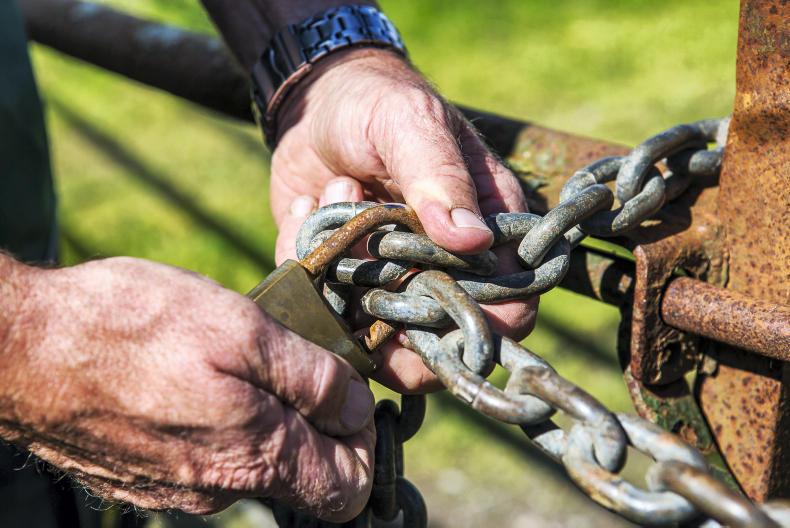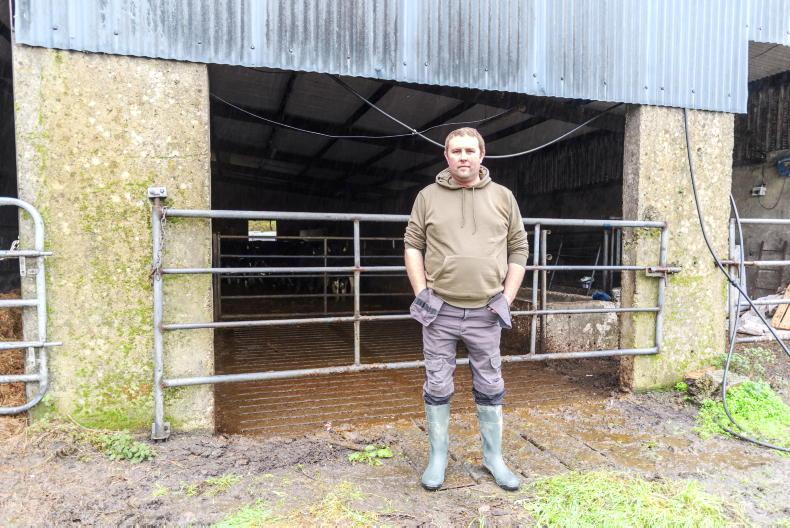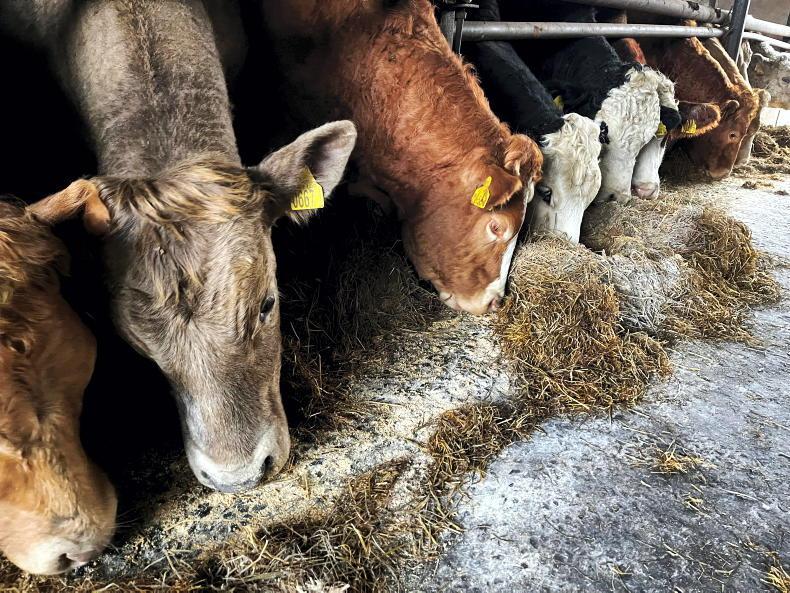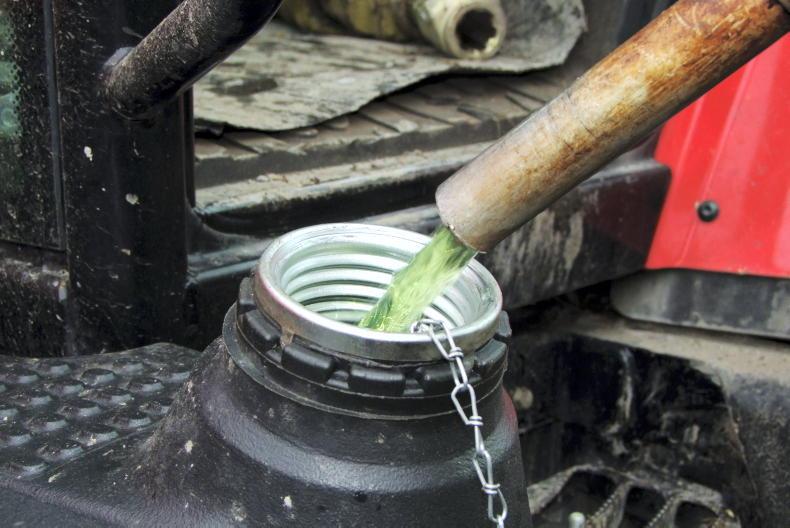The direct cost of rural crime comes to hundreds of thousands each year, with farms targeted to a growing extent in recent years.
On top of the cost of items stolen, or damage caused to property, rural crime can also be a cause of significant grief and worry.
It’s impossible to completely eliminate the risk of rural crime on farms, but some steps can be taken to reduce the risk and deter criminal activity.
Secure and mark valuable property
There are certain blackspots where farms have been repeatedly targeted and items such as trailers and quads have been stolen from farmyards.
To start with, limit free access from the main entry point to the farm. Some thieves have overcome this by gaining access across adjoining lands, but in most cases it should help.
Erecting heavy duty gates may be more amenable on large units, while on most yards there is usually a way of installing gates at the entry point or securing easily moveable equipment in sheds.
Where possible, equipment should be identified by a permanent mark.

Occupiers notice.\ Donal O' Leary
Advancements in technology and investments in tracking devices may provide an opportunity to give protection to expensive machinery.
Other examples include monitors which record when diesel is being taken from a tank and notify a mobile phone.
Improve lighting
Yard lighting or external light sensors can be a good way of improving visibility and identifying movement.
Yard signage
Signs denoting that the premises are monitored by CCTV or have alarms may help to deter entry. The presence of a guard dog may also help.

Shed with lock and CCTV.
CCTV systems are becoming more advanced and can now be linked with your phone, while increased competition has lowered the cost of devices.
Avoid bogus traders
Unfortunately, for crime to prosper there has to be an outlet for stolen items. Traders offering deals or cold calling in yards should not be entertained, particularly where they are advocating cash sales.
A deal that looks too good to be true usually is. Taking the number plate of vehicles and reporting them to gardaí is a good way to follow-up on the authenticity of suspect traders.
Investigate questionable service providers
Every year, the Irish Farmers Journal gets numerous calls from farmers saying service providers gave them a brochure with our company logo printed alongside others.
Shed painting contractors that are apparently promoted by this paper seems to be a regular occurrence. These are always bogus.
Contacting the companies mentioned will quickly clarify the authenticity of these claims.
Trespassing with dogs
Illegal coursing has become a growing concern for land owners in recent years, with a significant increase in the number of cases reported and the number of farmers who felt intimidated after confronting trespassers.
Gardaí in Tipperary have previously said they have faced difficulty in prosecuting individuals caught illegally hunting hares on farm lands.
They encouraged those affected to continue to contact the gardaí, adding that under Section 38 of the Wildlife Act, any person who uses a lamp or artificial light has committed an offence.
Don’t publicise vacant premises
A downside of social media is that travel plans or special occasions like weddings often signal that a premises will be vacant.
Refrain from posting such information and ask neighbours, friends or relatives to keep an eye on the farm when you’re away.
Report suspect behaviour
In some areas, neighbourhood watch groups have reduced thefts by reporting any unusual behaviour and unknown vehicles to the gardaí.
The direct cost of rural crime comes to hundreds of thousands each year, with farms targeted to a growing extent in recent years.
On top of the cost of items stolen, or damage caused to property, rural crime can also be a cause of significant grief and worry.
It’s impossible to completely eliminate the risk of rural crime on farms, but some steps can be taken to reduce the risk and deter criminal activity.
Secure and mark valuable property
There are certain blackspots where farms have been repeatedly targeted and items such as trailers and quads have been stolen from farmyards.
To start with, limit free access from the main entry point to the farm. Some thieves have overcome this by gaining access across adjoining lands, but in most cases it should help.
Erecting heavy duty gates may be more amenable on large units, while on most yards there is usually a way of installing gates at the entry point or securing easily moveable equipment in sheds.
Where possible, equipment should be identified by a permanent mark.

Occupiers notice.\ Donal O' Leary
Advancements in technology and investments in tracking devices may provide an opportunity to give protection to expensive machinery.
Other examples include monitors which record when diesel is being taken from a tank and notify a mobile phone.
Improve lighting
Yard lighting or external light sensors can be a good way of improving visibility and identifying movement.
Yard signage
Signs denoting that the premises are monitored by CCTV or have alarms may help to deter entry. The presence of a guard dog may also help.

Shed with lock and CCTV.
CCTV systems are becoming more advanced and can now be linked with your phone, while increased competition has lowered the cost of devices.
Avoid bogus traders
Unfortunately, for crime to prosper there has to be an outlet for stolen items. Traders offering deals or cold calling in yards should not be entertained, particularly where they are advocating cash sales.
A deal that looks too good to be true usually is. Taking the number plate of vehicles and reporting them to gardaí is a good way to follow-up on the authenticity of suspect traders.
Investigate questionable service providers
Every year, the Irish Farmers Journal gets numerous calls from farmers saying service providers gave them a brochure with our company logo printed alongside others.
Shed painting contractors that are apparently promoted by this paper seems to be a regular occurrence. These are always bogus.
Contacting the companies mentioned will quickly clarify the authenticity of these claims.
Trespassing with dogs
Illegal coursing has become a growing concern for land owners in recent years, with a significant increase in the number of cases reported and the number of farmers who felt intimidated after confronting trespassers.
Gardaí in Tipperary have previously said they have faced difficulty in prosecuting individuals caught illegally hunting hares on farm lands.
They encouraged those affected to continue to contact the gardaí, adding that under Section 38 of the Wildlife Act, any person who uses a lamp or artificial light has committed an offence.
Don’t publicise vacant premises
A downside of social media is that travel plans or special occasions like weddings often signal that a premises will be vacant.
Refrain from posting such information and ask neighbours, friends or relatives to keep an eye on the farm when you’re away.
Report suspect behaviour
In some areas, neighbourhood watch groups have reduced thefts by reporting any unusual behaviour and unknown vehicles to the gardaí.












SHARING OPTIONS